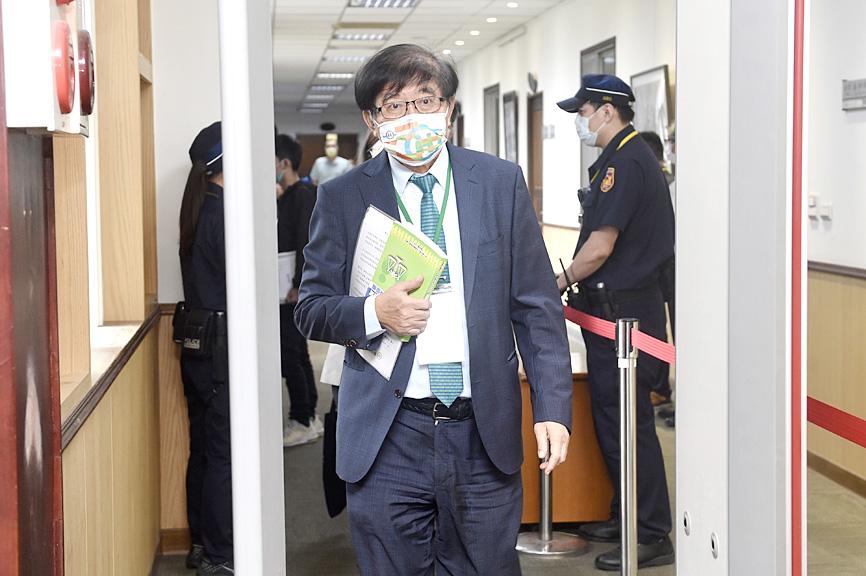The Constitutional Court yesterday found that the National Health Insurance Administration (NHIA) allowing access to the national health database for academic research was partly unconstitutional.
In the court’s Interpretation No. 13, Judicial Yuan President Hsu Tzong-li (許宗力) said that given the lack of an independent monitoring mechanism to ensure data protection under the National Health Insurance Act (全民健保法), the act should be revised within three years to improve personal data protection.
Health authorities have not clearly stipulated the procedures for the use, organization, deletion, termination and withdrawal of information in the health insurance database, which violated laws on personal-data retention, Hsu said.

Photo: George Tsorng, Taipei Times
If an amendment to the act is not made within three years to rectify this, individuals would be permitted to request that their health-insurance information not be used for purposes other than the National Health Insurance program, he said.
The interpretation comes after a decade-long campaign by Taiwan Association for Human Rights secretary-general Tsai Chi-hsun (蔡季勳) and six other rights advocates demanding that the NHIA prohibit outside access to the information.
The group said that although the data provided to researchers had identifying information stripped out, there was still the possibility that people could be indirectly identified by comparing the data with other records.
They added that sharing access to the information violated due legal process, as the public was not informed.
The NHIA said that if the information could not be shared, or the database closed completely, it would “not only affect academic research, national policy formulation, publication of medical results, and the development of public medicine and health, but also hinder the advancement of medical research.”
The NHIA added that the rights of individuals to withdraw personal information should be handled by legislators, and not determined by the court.
The Ministry of Health and Welfare also argued in favor of maintaining research access to the database, saying that it had contributed to Taiwan’s successes in staving off a local epidemic in the early stages of the COVID-19 pandemic.
“Requiring the complete de-identification of information or giving the public the right to withdraw from the database may cause sampling errors,” it said. “It may also trigger a strong backlash from the scientific and academic circles, and lead to a crisis of disease prevention in our country.”
Citing an example of how the database aided medical research, NHIA Director-General Lee Po-chang (李伯璋) said that it had helped doctors determine that the use of immunotherapy drugs on cancer patients did not produce significantly better results than traditional targeted-drug treatments.
The finding was used to convince pharmaceutical companies to reduce prices on immunotherapy drugs, he said.
The database had also helped doctors improve the survival rate of hepatitis C patients through early treatment before the onset of liver cancer, he said.

Alain Robert, known as the "French Spider-Man," praised Alex Honnold as exceptionally well-prepared after the US climber completed a free solo ascent of Taipei 101 yesterday. Robert said Honnold's ascent of the 508m-tall skyscraper in just more than one-and-a-half hours without using safety ropes or equipment was a remarkable achievement. "This is my life," he said in an interview conducted in French, adding that he liked the feeling of being "on the edge of danger." The 63-year-old Frenchman climbed Taipei 101 using ropes in December 2004, taking about four hours to reach the top. On a one-to-10 scale of difficulty, Robert said Taipei 101

Taiwanese and US defense groups are collaborating to introduce deployable, semi-autonomous manufacturing systems for drones and components in a boost to the nation’s supply chain resilience. Taiwan’s G-Tech Optroelectronics Corp subsidiary GTOC and the US’ Aerkomm Inc on Friday announced an agreement with fellow US-based Firestorm Lab to adopt the latter’s xCell, a technology featuring 3D printers fitted in 6.1m container units. The systems enable aerial platforms and parts to be produced in high volumes from dispersed nodes capable of rapid redeployment, to minimize the risk of enemy strikes and to meet field requirements, they said. Firestorm chief technology officer Ian Muceus said

MORE FALL: An investigation into one of Xi’s key cronies, part of a broader ‘anti-corruption’ drive, indicates that he might have a deep distrust in the military, an expert said China’s latest military purge underscores systemic risks in its shift from collective leadership to sole rule under Chinese President Xi Jinping (習近平), and could disrupt its chain of command and military capabilities, a national security official said yesterday. If decisionmaking within the Chinese Communist Party has become “irrational” under one-man rule, the Taiwan Strait and the regional situation must be approached with extreme caution, given unforeseen risks, they added. The anonymous official made the remarks as China’s Central Military Commission Vice Chairman Zhang Youxia (張又俠) and Joint Staff Department Chief of Staff Liu Zhenli (劉振立) were reportedly being investigated for suspected “serious

American climber Alex Honnold is to attempt a free climb of Taipei 101 today at 9am, with traffic closures around the skyscraper. To accommodate the climb attempt and filming, the Taipei Department of Transportation said traffic controls would be enforced around the Taipei 101 area. If weather conditions delay the climb, the restrictions would be pushed back to tomorrow. Traffic controls would be in place today from 7am to 11am around the Taipei 101 area, the department said. Songzhi Road would be fully closed in both directions between Songlian Road and Xinyi Road Sec 5, it said, adding that bidirectional traffic controls would